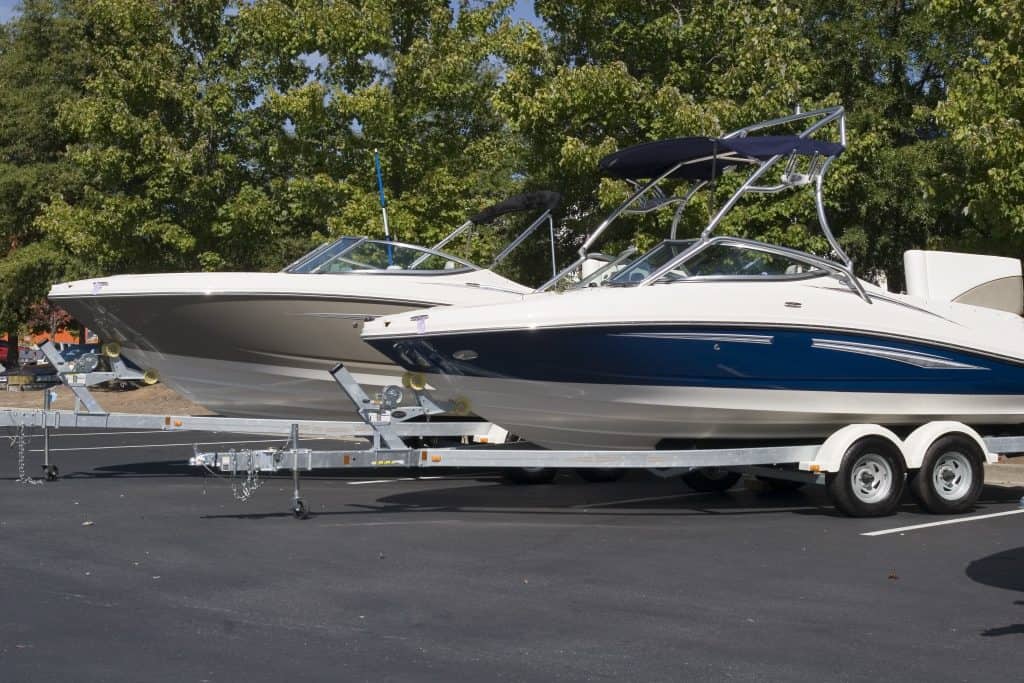
If you’re thinking about towing your ski boat and trailer, it’s important to know how much they weigh. If they’re too heavy, you might find that your trailer hitch isn’t quite up to the job, and that’s not something you want to find out while on the road!
On average, a ski boat weighs about 5,000-6,000lbs. A trailer that is big enough to carry a ski boat tends to weigh between 900 and 1,000 lbs. Putting these two averages together, a ski boat and trailer could weigh between 5,900 and 7,000 lbs. Of course, these are only averages. The actual weight may differ.
There’s a lot you need to know about towing a ski boat and trailer! Once you know the weight, you should also know what kind of trailer hitch you have, if your vehicle is even up to this kind of thing, and general trailer safety rules!
Average Ski Boat Weights (With Examples)
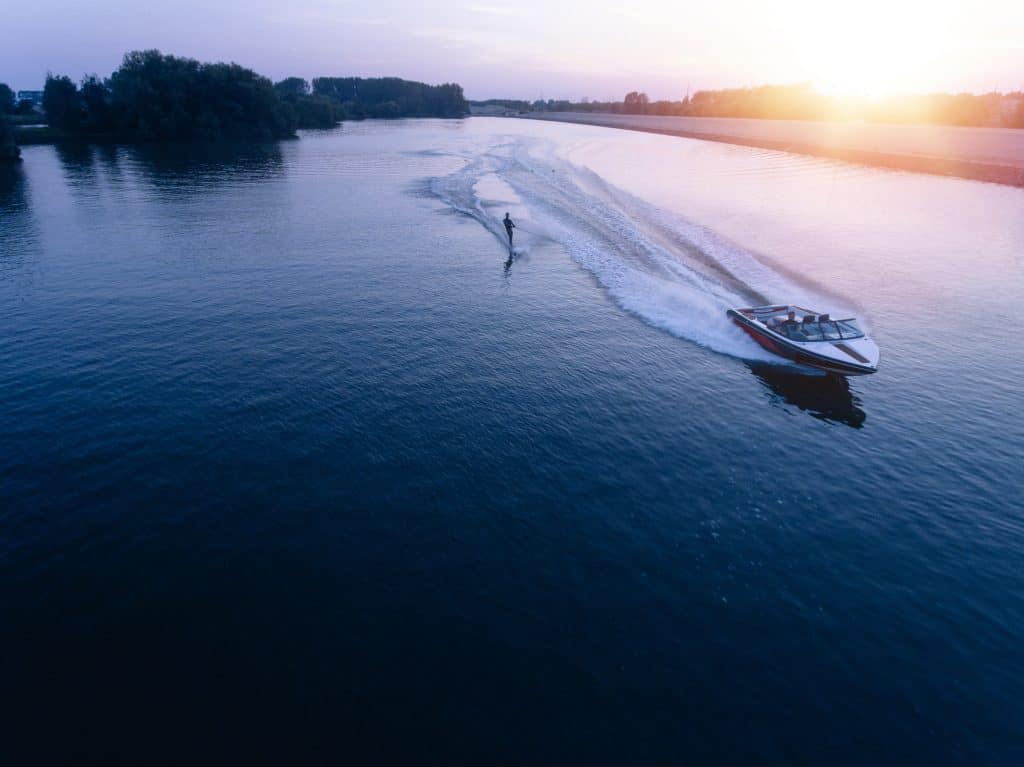
As you can already tell (and probably already knew) ski boats are pretty heavy. You probably already knew that there are lots of different kinds of ski boats out there.
Because of this, we’ll always speak in terms of average ski boat weight. There’s will be some variation out there, and that’s just natural deviation. In any case, the most important weight is the weight of your ski boat!
If you’re thinking about getting a ski boat, we’ll go over some examples so you know roughly what to expect. Perhaps it will even give you an idea of what kind of ski boat you’d like to buy!
Before we jump right into the actual boats, there’s one important note to go over: dry weight. If you’ve been pulling boats before, you’ll already be familiar with this term.
Dry weight is the advertised weight on any boat. It’s the weight of the boat without gasoline in it, and gear you might throw in your boat, or any additions you might have made. So, this is the weight you might think you are going to be towing, BUT THE THINGS YOU LOAD ON YOUR BOAT MATTER!
Gasoline is probably the biggest weight you might add to your boat. If you figure that a gallon of gasoline weighs about 6lbs, and you put 20-30 gallons of gas in, that’s an additional 120-180 lbs.! And a lot of boats carry even more than that!
What we’re going to go over here is the advertised weight or the dry weight. Keep in mind that after all is said and done, these boats will probably weigh more than what we have listed here.
In fact, smaller boats can weigh as little as 2,500 lbs., and larger ones can weigh in excess of 8,000 lbs.!
Like I said before, the weight of your boat is the weight that really matters! Now, let’s jump into the examples to give you an idea of what you should expect!
1. Centurion Ri257 – 5,350 pounds
Our first ski boat comes in at a cool 5,350 lbs.! The Centurion Ri257 is one of the nicer ski boats we’ll mention here. In terms of other measurements, this boat is 25’7″ in length, and can seat 18.
This is definitely one of the bigger ski boats out there in terms of length and seating capacity, but it sure is not the heaviest! As you’re about to see, ski boats get much heavier than this.
2. Malibu M235 – 6,200 pounds
Our next boat is the Malibu M235 is a little bit smaller than the Centurion, but it actually weighs more! This beast of a boat comes in at 6,200 lbs. and is 23 feet long. It can seat 17, and comes with lots of customization options!
This is the heaviest boat we chose to include on this list. That having been said, there are ski boats out there even heavier than this one. Some are several thousand pounds heavier than the Malibu M235!
3. Super Air Nautique 230 – 4,650 pounds
Our third and final boat is smaller than our other boats and falls a little below what we would consider “average”. The Super Air Nautique 230 weighs 4,60 lbs. and comes in just a little longer than 23 feet and can seat 15 people.
This is the smallest boat on this list. If you’re thinking that this is still too big, that’s okay! There are plenty of smaller options out there still. This boat just defines the lower end of “average”.
Like we prefaced this earlier, the weight listed is the DRY WEIGHT. Your boat, in real life, will weigh much more. So how do you know exactly how much your boat is going to weigh when it’s all set to go?
Well, ladies and gentlemen, I have found the best resource. It is a boat weight calculator. Given, you have to know a good amount of info, but it is so helpful. To use this weight calculator from Venture Trailers, all you have to do is click here!
Average Trailer Weights (With Examples)
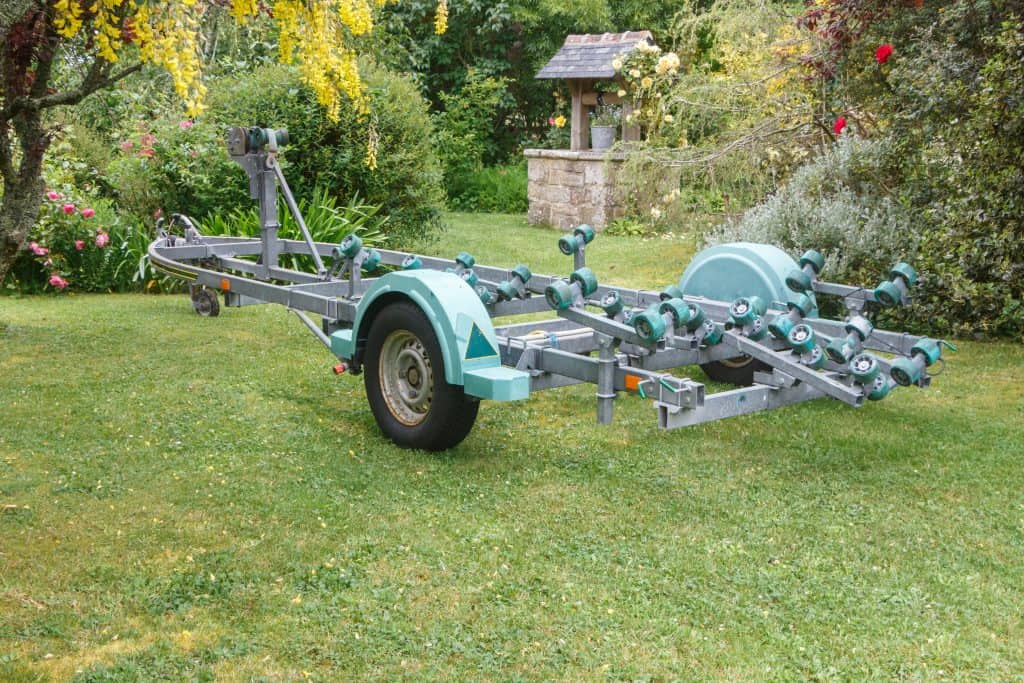
With the invention of the wheel, humankind stepped into a realm that no species had entered before. In fact, a group of scholars some years ago ranked the two most influential discoveries of all time as 1) fire and 2) the wheel.
Trailers epitomize what the wheel was invented to do. Boats weighing thousands of pounds can be easily moved by these ingenious devices. Without trailers, moving these huge boats would be nigh impossible.
Of course, the boat isn’t the only weight you need to keep track of when you’re hauling a boat somewhere. Trailers, although not as heavy as boats, also weigh a good amount. On average, they weigh between 900-1,000 lbs.
Of course, trailers used for smaller boats can weigh significantly less. For example, some canoe trailers can weigh 50-150 lbs. Larger trailers for boats like sailboats can weigh a few thousand pounds.
The reason it’s important to know how much your trailer weighs is that when you calculate how much you’re hauling, you’ll add the weight of your boat to the weight of your trailer you will be able to come up with the total weight. If you forget this weight, you will probably be sorry later!
Of course, you might be inclined to look for a lighter trailer so you have less to haul, but larger, heavier trailers can haul more weight. Also, you’ll need a trailer that is big enough to fit your boat on.
Taking all of these things into consideration, you should be prepared to look at some trailers! We’ve only included three examples here, so feel free to do some more research elsewhere!
The trailers we’ve included below are all of very high quality and are large enough to haul one or more of the boats we listed above. Let’s take a look at them!
1. Karavan Tandem Axle 4,800 Pound Roller – 980 pounds
We started with the trailer that can haul the least weight but isn’t the lightest trailer we have on this list. The Karavan Tandem Axle 4,800 Pound Roller has four 14 inch tires and requires trailer brakes.
As you may have guessed, this trailer has a carrying capacity (the amount of weight the trailer can hold at maximum) is 4,800 lbs. This means that if you would have to have a smaller/lighter ski boat.
2. Venture Aluminum Boat Trailer – 900 pounds
Our next trailer is quite the beauty! The Venture Aluminum Boat Trailer, while only weighing 900 lbs., can haul 6,425 lbs.! This means you can have a pretty decent sized boat carried with this guy!
It comes standard with breaks on one axle and has four 15 inch tires.
3. Karavan Tandem Axle Aluminum 8,600 Pound Bunk Trailer – 1,320 pounds
Our largest trailer by over 400 lbs. also can haul more than any of our other trailers. In fact, the Karavan Tandem Axle Aluminum 8,600 Pound Bunk Trailer can haul, as the name implies, 8,600 lbs. Hefty!
Even though this is great, because it means you can have a huge boat, it is pretty heavy. Plus, combined with the weight of the boat, you might not have a vehicle fit to tow it. So, how do you know your truck is up for it?
Is Your Vehicle Up to the Test?
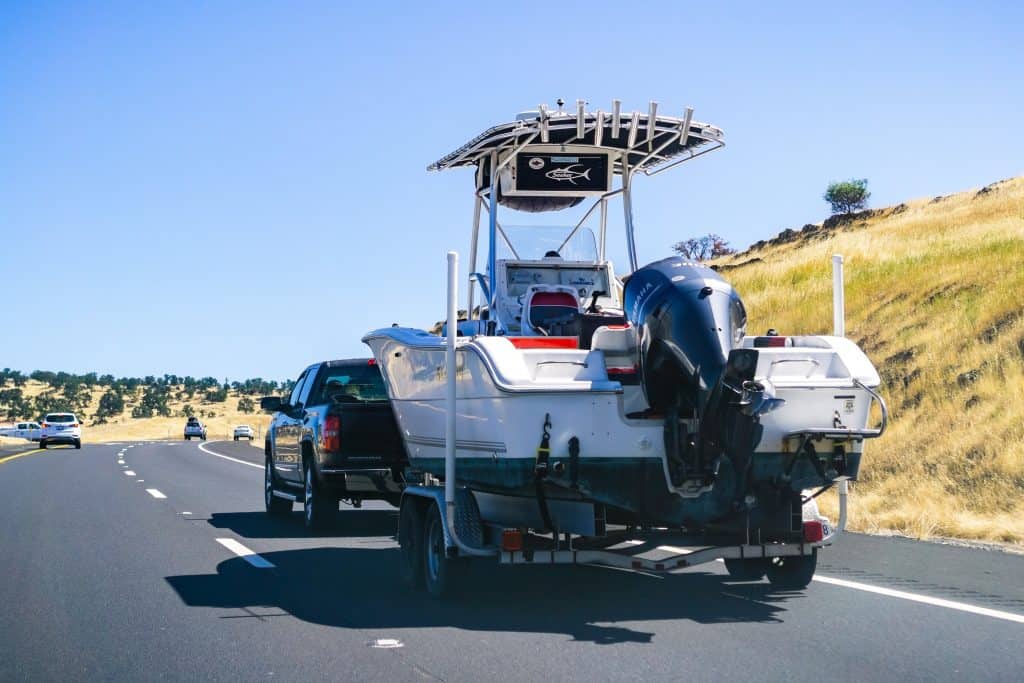
Knowing the weight of your trailer and boat is only half the battle! Next, you need to make sure you can actually haul said trailer and the boat on top of it!
Starting with your car, we’ll cover exactly what it is you need to have in order to haul all of this weight. This is crucially important because it determines whether or not you can haul the trailer and whether or not you’ll still have a back bumper!
For the uninitiated, getting a hitch may seem like a pretty simple business. You think, Step 1: Decide to get hitched (pun intended). Step 2: Go to Amazon. Step 3: buy a trailer hitch. Simple, right? Well, not so fast.
First things first, you need to take a serious look at your vehicle. How much can it haul? Can it even have a hitch attached? What will it take to get a hitch on?
Maybe you already have a hitch on your vehicle. In that case, you need to determine whether or not your vehicle and hitch can haul your trailer and boat! We’ll get to how to do that in just one second.
Now, most of the time, you’ll need a bigger vehicle to haul something as heavy as a ski boat. SUV’s, trailers, and some other big vehicles are normally required to do this kind of hauling.
Unfortunately, there’s not really a way around that reality. In order to pull big things, you need a big puller. That there is some good knowledge fer ya to been knowin’!
It’s not hard to know how much your vehicle can haul and what kind of hitch it will take. You can use Google to figure that out pretty easily! You can also usually find this information in your owners manual.
Below, we’ve made a list of 3 vehicles that could handle hauling ski boats and trailers. We’ve tried to give a fair diversity of vehicles so you can get a good feel for the kind of vehicle you might need!
1. Chevrolet Tahoe – 8,600 Pounds Capacity
We start out our list of cars with the Chevrolet Tahoe. This is one good looking car, and it can also haul quite a bit of weight! Coming in at a max towing capacity of 8,600 pounds, this is a pretty heavy-duty SUV!
On top of that, the Tahoe seats nine and is totally loaded with modern features!
2. GMC Yukon – 8,500 Pounds Capacity
Up next we have the GMC Yukon. The Yukon can haul an impressive 8,500 pounds. Plus, the Yukon has tons of storage space for your next boating trip! If you want even more storage space, you can look into the Yukon XL.
3. Ford F-150 (250hp) – 10,000-11,500 Pounds Capacity
Last, but certainly not least, we have the Ford F-150. This truck truly is a classic! It comes with a couple of different options on the engine, so it’s important to know that you need to pay attention to the engine.
The standard 250hp engine can haul 10,000-11,500 pounds depending on other variations!
Getting the Right Hitch
Up next, you need to make sure you need to get the right hitch on your vehicle. There’s a lot of lingo surrounding towing, so it can get pretty confusing if you’re unfamiliar.
In fact, even if you’re familiar, it can still get a little confusing sometimes. We’re going to keep this as simple as possible so that there is going to be no way you can get confused!
The goal of this section is just to give you a good idea of what you’re looking for! This isn’t meant to be a comprehensive compilation of everything you need to know about hitches.
The first thing to know is there when we talk about trailer hitches, we’re talking about hitches, ball mounts, hitch balls, trailer couplers, and safety chains. That’s super important to know at the outset.
Next, you need to know that some hitches are easy to put on to your vehicle and some are not! If you’re worried about putting on a new hitch, there are plenty of places that will put your hitch on for a fairly low cost!
Third, it’s important to look at two important numbers on your hitch. The first is gross trailer weight (GTW) and tongue weight (TW). GTW determines overall hauling capacity and TW determines how much you can put on the hitch itself.
Generally speaking, TW is one-tenth of the GTW. This isn’t always true, but it generally is. While it’s never safe to assume (because we all know what that does), this is a nifty little measurement trick you can use!
Up next, it’s important to know that trailer hitches have different classes. These aren’t the kind of classes you take in school or like the classes you pick from in a video game. These are like ratings of toughness.
Generally speaking, you’re looking for class three. There are higher classes, and if that floats your boat (pun intended), then go for it! But class three is usually what you’re looking for.
Now you basically know everything you need to know about trailer hitches! Get out there and do some shopping! You’ll have plenty of problems still, but a hitch ain’t one.
Trailer Safety Guidelines
Once you have a boat, a trailer, a worthy vehicle, and the right hitch, you’re ready to go! If you haven’t pulled a trailer before, there are some things that you need to know.
Driving with a trailer is not the same thing as just driving. That may sound obvious because you’re suddenly driving a much larger vehicle overall, but there are other things to be aware of too.
First, be absolutely positive that your trailer is attached to the trailer hitch on your vehicle. Check once, check again, and then check one more time. Look at the latch, safety pin, safety chain, etc.
Then makes sure that your trailer brakes are working. Having just your vehicle brakes isn’t enough when you’re hauling a trailer. You also need to make sure that your trailer brakes are working!
When you’re actually on the road, maintain a greater distance between your vehicle and the other vehicles on the road. This is because it’ll take you longer to stop and you just never know when something might happen with your trailer!
You’ll also want to take extra-wide turns. Now that you’re twice as long (or even longer) than you were before, you must be extra careful to avoid curbs, signs, and other vehicles.
Don’t think you can just reverse with a trailer if you’ve never done it before. If you’re going to be backing up at some point (which you will be with your boat), then find a parking lot and get some practice in!
Parking might be extra difficult as well! Even if you aren’t backing in, there just aren’t as many spots that a trailer can fit in. Doing a little bit of planning beforehand can make it easier to find a good parking spot!
Last, but certainly not least, remember to go slower than you usually would. This is true in every situation. Drive slower, back up slower, park slower, etc. Especially if you’re new, just take it slow.
Overall, the idea here is that you need to use your noggin a little bit extra when you’re driving a trailer. There are plenty of resources out there if you’re still feeling a little unprepared!
Conclusion
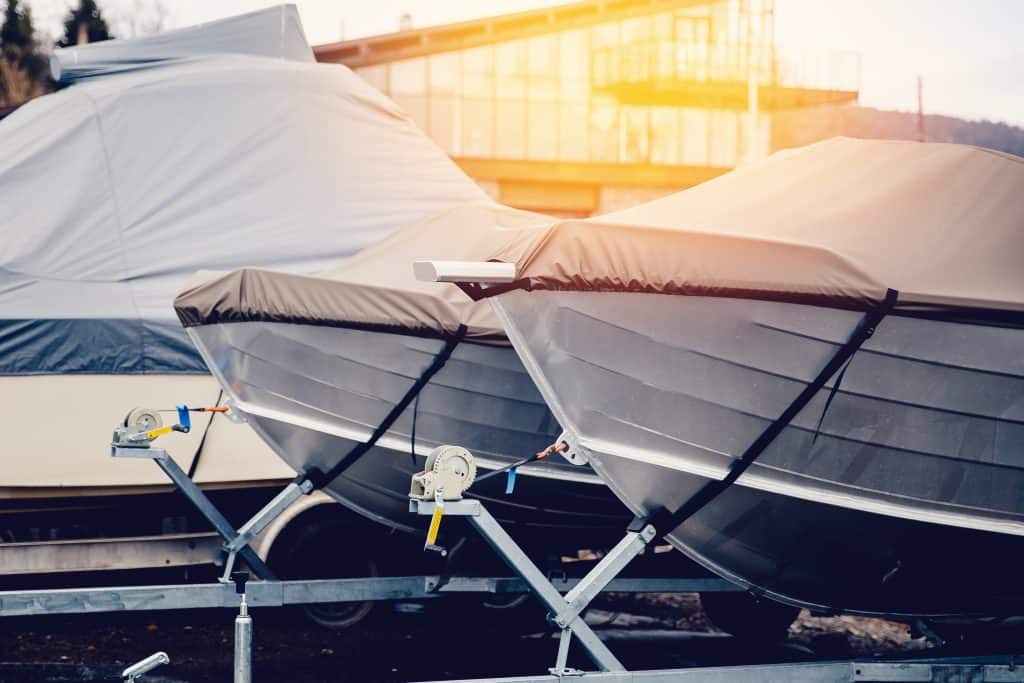
There are a couple of common themes that we’ve touched on here as we’ve discussed the various parts of driving with a ski boat and trailer. We’ll take a look at what some of these common themes here.
But first, let’s briefly summarize what we’ve talked about here. Since we’ve covered so much info, it’ll probably be nice to review the things that we’ve covered quickly.
A Brief Summary
First: ski boats and trailers are heavy. You need to know their combined weight so you can figure out what you need to use to haul them. Make sure to be careful about dry weight vs actual weight!
Second: find out how much weight your car can haul. You’ll probably need a larger vehicle, like a truck or SUV, in order to haul your boat and trailer. It would be no fun to buy a ski boat and trailer just to realize you can’t haul them!
Third: get the right hitch for your vehicle, and a hitch that is strong enough to haul your boat and trailer. There’s a lot of jargon involved in shopping for hitches, so refer to the suggestions made above to get some clarification on what you’re looking for!
Fourth: be safe when you’re out on the road. If you’re new to hauling a trailer, make sure you get some practice in before you do anything to expeditious!
We made lots of different suggestions above about cars, boats, trailers, and hitches. Really, we know that each situation will be a little different. We hope you learned some things here that will help you make more informed decisions!
Deciding to get a ski boat is an exciting decision! But there’s also so much that you, the owner, need to know about boats. The goal of this article was to help you in one avenue of boat knowledge!
There are also other resources out there that can help you with your particular decision. Like we mentioned at the outset, most of the numbers we used are averages. You might need special help with a more unique situation!
The most important part of this summary is that in every section we advised making safe, informed decisions. If you try to do that, you’ll be okay out there!
Common Themes
As you read, you may have noticed some common themes. Because each situation will be a little bit different, it’s important to recognize these common themes since they make up the overall lessons to be learned.
The first is the theme of research. We started your work for you. We mentioned different kinds of boats, trailers, and vehicles. We also mentioned different things to know about hitches and safe driving.
But this isn’t all the research you need to do! We’ve pointed you in the right direction and helped you to know what to look for, but this article certainly isn’t a buyers guide, nor do we pretend to know every minute detail of your exact circumstance.
The fact that you’re here shows that you already know that some research needs to be done, but if you really intend to haul a ski boat, there’s still more work to be done!
The second theme is about common sense. It’s super important to have as much information as you can about ski boats and trailers, but at some point, you just need some common sense.
For example, a Subaru Imprezza can’t haul a trailer and ski boat. Also, you need a trailer strong enough AND long enough to haul your ski boat. These things are just common sense.
Alas, all too often, common sense isn’t so common after all. That having been said, we trust you and know that YOU must have common sense. You’re smart enough to be reading this article, so that proves something, right?
The third and final theme that we hope you noticed in this article is to have fun! Ski boats are cool, and honestly, towing things is fun too. Get out there and have some fun!
Happy boating!
